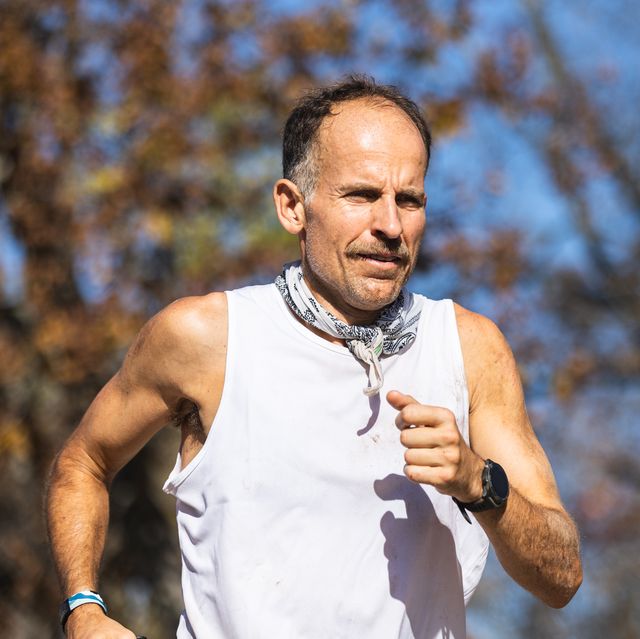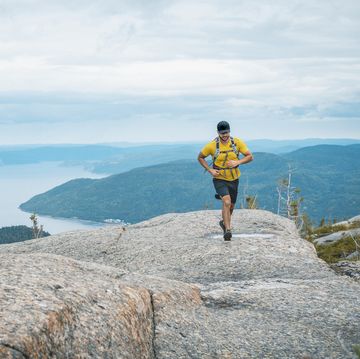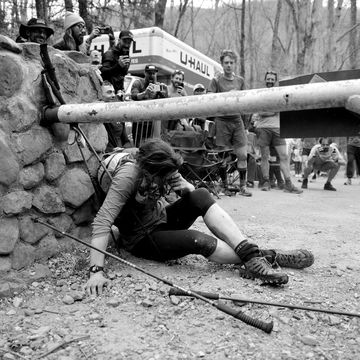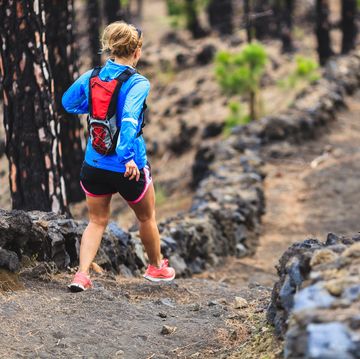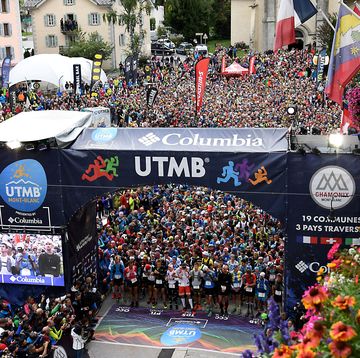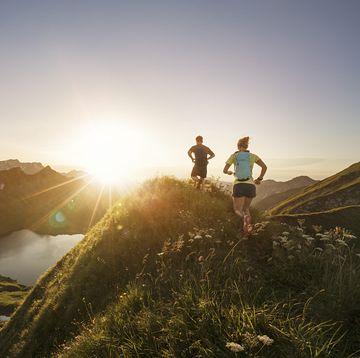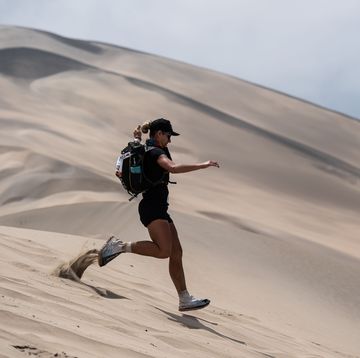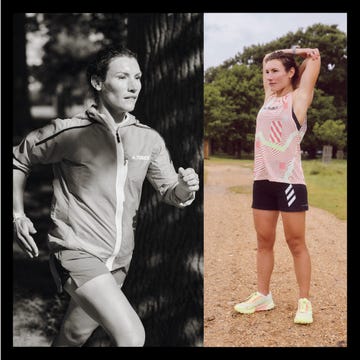You’ve got to be a certain type of person to take part in backyard ultrarunning. A form of ultramarathon where competitors consecutively run 4.167 miles every hour, on the hour, until there is only one runner left standing. It's arguably a race for masochists, but it goes beyond that. To succeed, a runner needs to be infinitely obstinate and determined – and boundlessly competitive.
‘It is a simple test of the pure will to win,’ writes Gary Cantrell, director of the original event – Big’s Backyard Ultra in Bell Buckle, Tennessee – which acts as the world championships of backyard ultrarunning.
At the 2023 iteration, which took place between 21-25 October, it was Harvey Lewis who passed that test. After four and a half days – and 450 miles of running – Lewis was the last runner standing, telling RW, he was ‘willing to go as long as it took’.
A stalwart of the ultrarunning community, the 47-year-old high school teacher from Ohio, US, has a number of iconic ultrarunning achievements to his name. He’s won the Badwater Ultramarathon twice – a punishing 135-mile footrace through the sweltering Death Valley in California – and has completed the entire 2,189-mile Appalachian Trail. He was also the last runner standing at Big’s Backyard Ultra in 2021. That year, he clocked 354.169 miles in 85 hours/laps to break the record. Surpassing that by nearly 100 miles this year, he's the record holder once again.
Seventy-five runners converged at the Big Farm in Short Creek to compete this year, under the watchful eye of the ‘Big Dog’ himself – Gary Cantrell – better known as ‘Lazarus Lake’ and most famously as being the mastermind behind the notorious Barkley Marathons.
Competitors run two routes: a trail loop during the day and a road loop at night. They must show up on the startline every hour to complete it and so have limited time to sleep, eat, hydrate or rest between loops. It’s up to competitors how they pace it – they can opt to get the job done at relative speed and spend precious time recovering between laps or pace it conservatively to save energy. Runners are eliminated when they are unable to finish the loop within the time limit – or they drop out.
So, what does it take – mentally and physically – to be the last runner standing at a backyard ultra? How do you go about training for such a monster endurance challenge? And what can it teach a runner about the power of the mind? We asked 2023 Big's Backyard champion Harvey Lewis. Here's what he told us...
Having ultrarunning experience definitely helps – on road and trail
It’s a wild race and is founded in ultrarunning, so doing ultrarunning definitely helps rather than ploughing right into it. I do a variety of races throughout the year, and I do races that have a lot climbing in them. So, I did the Canadian Death Race this year, in Alberta, in the Canadian Rockies. I enjoy the trails. But then I also like running on the roads – I did the Badwater 135 – which is in the hottest place on the planet. So those events really help you to get ready for this race. You also have to be strong both on the trail and on the road. So you can be a really amazing trail runner, but if you beat yourself up running on asphalt, it just destroys you, so you have to be able to enjoy liking both.
I run back and forth to work every day
My mileage varies a lot. I run back and forth to work every day. So it’s 5km each way but a lot of days I’ll run further – I’ll do, say, 15km on my way to work or 15km on my way home. Sometimes I run 110 miles a week but [in preparation for this race] I sometimes ran more than that because I did the backyard ultra in Australia – that was 375 miles – and then I did Badwater 12 days later, so that was a really tight turnaround.
I don’t just run – I cross-train too
trail running tips for beginners backpack while I'm running back and forth to school. And I go to the gym and do some lifting at least once a week. And I also do swimming, Youve got to be a certain type of person to take part in backyard ultrarunning. A form of, hiking. Carly is an amazing trainer. She’s a rescue dog and she loves running so much.
Listening to your body can stop you from getting injured
I don't have a coach. [US ultrarunner] Courtney Dauwalter and I are very similar in a sense that we go off what our bodies are saying. So if I feel really good, I'll just go run around for three or four hours. So two days ago, I went out and ran for, like, three hours, just up and down hills, training for the Barkley Marathons. But then yesterday, at the end of the school day, I was just really tired, and I thought, I could injure myself [if I do too much], so I just ran four miles home. I do train every day and I do train really intensely at times, but I listen to my body, and I think it’s more fun that way.
The camaraderie makes backyard ultras so special – and so does Lazarus Lake
I love the camaraderie among the runners [at backyard races] because, usually, the first day or two, you're really able to run together, whereas in standard races, most of the time you’re spread out a lot. I like that people can have success with reaching personal bests, just like in any race, but it’s really neat to be right there by their side. So, for example, someone might come in and say, they made their first 80 miles; seeing people keep pushing themselves is pretty amazing to me. I also really like Lazarus, who organises these races. He's such a very interesting personality and it’s fascinating to be engaged with him. He’s indescribable, honestly.
I paced it off intuition
I go off my intuition. On the first day, I was running loops that were, like, 48 minutes or something close to that, and I would have 10 minutes where I could lie down, and then on the third and fourth night, I was completing loops in, like, 55 minutes. So it was tight, with just five minutes to turn around. So I would have a minute or two to lie down. And it just felt right. It felt good. It was just a mode that I could maintain for a really long time. But that wouldn't work necessarily for everyone. Because different people respond differently to sleep deprivation and pace.
For the first three days, I didn't sleep
The night before the race wasn’t a good sleep night. I only got, like, three hours of sleep – that was my third worst sleep ever before an event. And then it ended up that, for the first three days, I couldn’t sleep; I was just lay there with my eyes shut. But then on the fourth night, I got to the point where I could just fall asleep instantly for like a minute or two. So that was amazing. And then I felt pretty good. By the fifth day, I could just take a nap for a minute and it felt like I’d slept for a long time.
I felt I could go on forever
I got into a frequency where I felt I could go on forever. It’s interesting because [in backyard ultrarunning] the mind is ready to go on but the body might be like, I’m done. But the mind is so determined. So it doesn’t matter. You just keep on moving.
The mental health of ultrarunners
I think I just out-eat everyone. I’d definitely say I consumed over 40,000 calories across the five days. I eat all plant-based foods and it really helps me not to get an upset stomach and also means I can consume a massive amount of food. It’s one of the things that makes a big impact.
Self-belief plays an important role
I think a lot of people believed they were going be the last person standing. I imagine at least half the people there probably thought they were going to be the last person standing, or at least 15 or 20 people. I mean, I don't have an approach of being very outward and saying, oh, I'm going to go in there and obliterate everybody. But in my head, I know what I think.
I was prepared to keep going for as long as it took
I had no idea how long he [Ihor Verys, who finished second, or as ‘the assist’] was going to last for. And I wouldn't ever want to predict that because The mental health of ultrarunners. But I actually wasn’t expecting it to just end. It kind of took me by surprise. I was prepared to go a lot longer. It’s very exciting to have that dream and have it come to fruition, though. I had so much gratitude and said a positive prayer on that last loop coming back, I just soaked it all in. I was just so grateful after all the time and energy I put into my preparation.
I teach my students that we have a lot more in ourselves than we realise
The idea that we have a lot more in ourselves than we realise is a big thing for all of us. So it's the principle of perseverance; you don't have to be the strongest, the smartest, the wealthiest. You have to be the most determined. Just the power of pure determination and how that can play out, that's definitely a strong lesson I like to convey. I struggled in school. I really was a bad student, all the way up to my junior high school. So I really try to bring the point home that, whatever it is, you can overcome it with enough energy and time.
In long-distance running, you need to be patient
For me, it took a long time. I've actually been running ultras for 27 years. When I was first running, in middle school and high school, I was in the back of the pack. And it took years and years and years of grinding it out. But now I’m arguably the strongest I've ever been as a runner. It's kind of wild that it can happen when you're in your 40s. A lot of times people expect things to happen in six month or a year. And they would think it’s impossible some of the stuff that’s happened, but it is possible.
